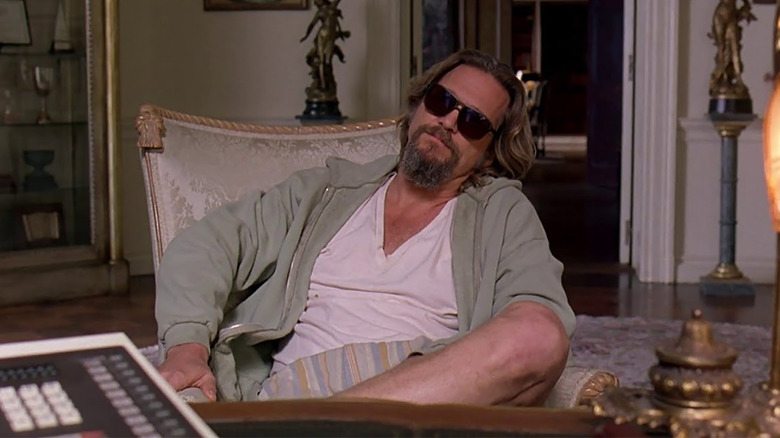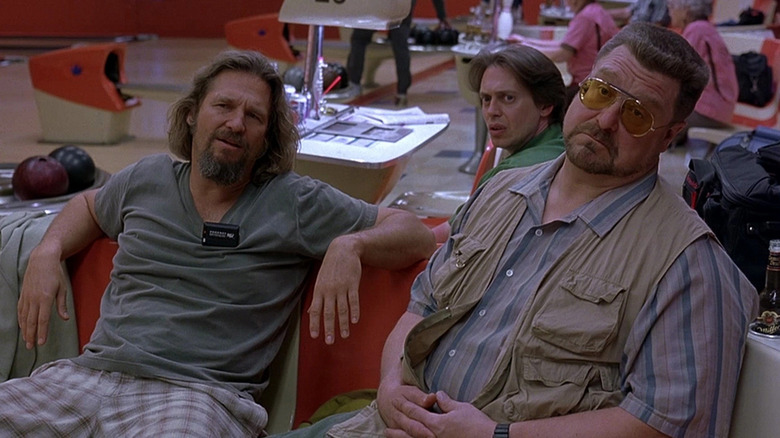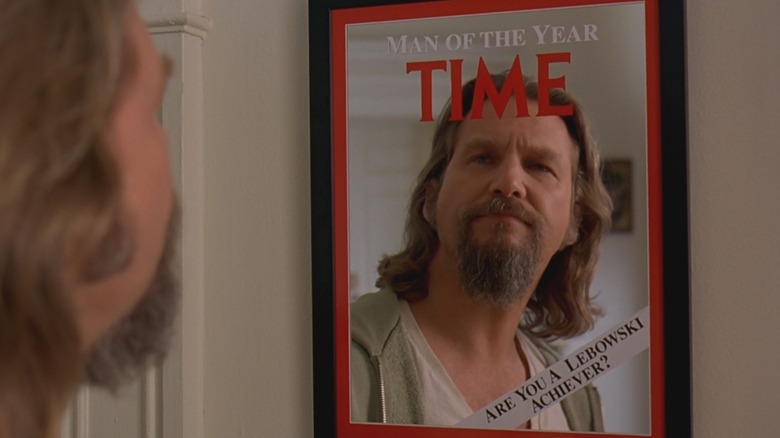The Big Lebowski Ending Explained: The Dude Abides
Since its release in 1998, the cult appeal of the Coen Brothers' "The Big Lebowski" has become self-evident among its many aficionados. Often perceived as a slacker parable, "The Big Lebowski" follows the merry misadventures of Jeffrey Lebowski (Jeff Bridges) as he is enlisted by a millionaire who shares his name (David Huddleston) to hand off the ransom payment in a kidnapping exchange. Jeffrey's slightly unhinged friend Walter (John Goodman) insinuates himself into the drop, trying to convince Jeffrey that the kidnapping victim — Lebowski's wife, Bunny, played by Tara Reid — was enacting a scam. So convinced is Walter, that he swaps out the ransom for his laundry.
Jeffrey then, unaimed, drifts out into L.A.'s criminal underworld, unwittingly finding himself in the role of a Raymond Chandler detective. Jeffrey, it should be noted, is a terminally relaxed, low-rent semi-burnout who long ago devoted his life to the simple creature comforts of bowling, cocktails, and the consumption of weed. A good film noir detective must be sharp and determined. Jeffrey is neither of those things. Indeed, Jeffrey seems resolutely unable to connect any dots in the kidnapping of Bunny Lebowski, with supporting figures often approaching him, the dupe of the film, with information he can barely synthesize.
The final catharsis of the movie has less to do with the solving of the mystery. Jeffrey does manage to put a scant few things together, finding that the Big Lebowski was indeed trying to scam Bunny's kidnappers from the jump. In fact, Walter's laundry coincidentally stood in for another ringer, something that Jeffrey finally realizes very late, his role in the story.
Jeffrey's catharsis
The climax of "The Big Lebowski" takes place in the Big Lebowski's mansion. Jeffrey has come to the conclusion that Walter replaced a ringer for a ringer, and goes to confront the offending party. Yes, Bunny, we find, was perfectly safe this whole time. Much younger than her husband, and a sexual free spirit, Bunny had merely taken an unexpected trip out of town, and a team of German nihilist/porn star kidnappers (led by Peter Stormare) took advantage of her absence from L.A. to fake her kidnapping and blackmail Lebowski.
In true Chandler-like fashion, this goes to a larger scheme involving Lebowski's attempts to embezzle money from his own charity and passing the "missing" cash onto Jeffrey, who would be too stupid to realize he had been duped. The high point of the scene, however, comes with the following exchange:
Jeffrey: "You thought that Bunny had been kidnapped and you were f***in' glad, man. You could use it as an excuse to make some money disappear. You'd just met me ... You human paraquat! You figured 'Oh, here's a loser. A deadbeat, someone the square community won't give a s*** about."
Lebowski: "Well, aren't ya?"
Jeffrey: [a pause] "Well, yeah!"
That brief pause says everything. In that moment, Jeffrey realized that, yes, he was the dupe. He wants to be outraged by Lebowski's dishonesty and natural assumption that he'll be ignored by the world around him, but has to admit that, yes, he is indeed a deadbeat that the "square" community doesn't give a s*** about. The audience also realizes that, despite how Jeffrey had been exploited, there will be no reward — monetary, moral or otherwise — for his catharsis. In the Socratic sense, his fleeting moment of self-examination will have to suffice.
The hippie's dream
Jeffrey was a child of the hippie movement — Bridges was 49 in 1998 — and lived out the hippie's dream of never "buying into" The System. It's easy to see why so many are drawn to Jeffrey as a character, as he is, in a very real sense, living the dream. He has few cares, lives modestly, and seems content to bowl, drink, and smoke weed. He is no hedonist, but a stoic, accepting that the world around him cannot be changed, but his reaction to it can. Nor can he impart wisdom, because he has none to impart. Jeffrey's oft-quoted final line sticks in the mind: "The Dude abides," he says, making use of his nickname. One cannot change the world. Indeed, the world punishes you for merely existing. But one can survive and abide as a human.
The brief pause in the above-transcribed climactic scene is Jeffrey realizing that he is indeed the fool of this story, but it's also the moment he realizes that's all he's ever aspired to be — and all he's ever really wanted. He doesn't long to be admired by what he calls "the square community." He doesn't want wealth or fame. He's found his niche. He does indeed realize that his position is derided and dismissed by a great number of people, and that society at large accepts him as a deadbeat ... and he's come to peace with that. The Dude abides, which is more than ambitious people can say.
Did the hippies "win" in the corporate sense? No. They won in that they discovered a modest, stoic life. Constructive? No. But constructive people, we see, are the corrupt ones.
L.A. and Elsewhere
To backtrack a bit, and to stress: Bunny was safe the whole time. She was simply not in Los Angeles.
It seems the Coens were making a comment about the short attention span of Los Angeles denizens. If someone isn't in L.A., they may as well not exist. Jeffrey, inspired by real-life L.A. citizen Jeff Dowd, might be an avatar for the city at large. Los Angeles — warm, expensive, and choked with welcome artifice — is a blissful, sun-bleached haven of vanity and self-absorption. This is a place that invites ambition, but encourages relaxation. One can climb the showbiz ladder ... or one can saunter ever gently toward being a beach bum. After a while, anything that doesn't happen in Los Angeles doesn't very much matter. While pursuing a lazy life of stoic acceptance, one falls into the pit of thinking L.A. is the center of the universe.
Jeffrey embodies both attitudes. Bunny is missing, in that she's out of town. There are two places on the planet: L.A. and Elsewhere.
This is underlined by the fact that The Dude is distracted. Indeed, he is distractible. The film itself is distractible. Even the film's narrator (Sam Elliott) gets distracted during his opening narration, admitting he lost his train of thought. This is the short attention span of the City of Angels personified. Everything is gorgeous and shallow, and there's nothing one can do but hunker down with your hobbies. One might say — in the Camus sense — that Jeffrey's rock is his thing, but Jeffrey is not struggling in a world of futility.
Are you a Lebowski achiever? What's the opposite of that? That's what Jeffrey is.



